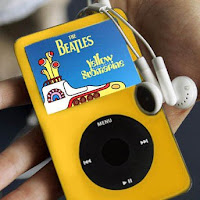
There are several examples of media convergence within the music industry, although audiences are still fairly passive and not as participatory as they are in other forms of media. Perhaps the newest innovation for the music industry is a new feature included in the latest edition of iTunes: the Genius Sidebar. This tool creates a playlist for users based on a specific song. The user selects a song, and the sidebar will generate a playlist based on that song's specific attributes. The sidebar will also make suggestions for new music that the user does not already have.
Another innovation in music marketing is the use of MySpace to promote bands. While many artists, such as Eric Clapton and Pink Floyd, adopted Web pages years ago, the crea tion of a special MySpace page is a fairly recent phenomenon, and it seems to be working. Nearly every popular band or artist has a MySpace page, and new and emerging bands are also keen to the site. Buddy Guy and Jakob Dylan are just two examples of artists that have embraced the popularity of MySpace. This service allows bands not only to promote new projects and announce upcoming concerts, but provides fans with a way to feel closer to the band. It is a way of creating a loyal fan base through the use of the Internet. Even artists who have been dead for 30 years or more, such as Jimi Hendrix, have official MySpace pages. And now other social networking sites are getting in on the music business. In an article published earlier this month, the Calgary Herald reported that Facebook was exploring the possibility of allowing music on its site.
tion of a special MySpace page is a fairly recent phenomenon, and it seems to be working. Nearly every popular band or artist has a MySpace page, and new and emerging bands are also keen to the site. Buddy Guy and Jakob Dylan are just two examples of artists that have embraced the popularity of MySpace. This service allows bands not only to promote new projects and announce upcoming concerts, but provides fans with a way to feel closer to the band. It is a way of creating a loyal fan base through the use of the Internet. Even artists who have been dead for 30 years or more, such as Jimi Hendrix, have official MySpace pages. And now other social networking sites are getting in on the music business. In an article published earlier this month, the Calgary Herald reported that Facebook was exploring the possibility of allowing music on its site.
Another clear example of the music industry's convergence with other media are the "Rock Band" and "Guitar Hero" video games.
Many bands such as Aerosmith and Metallica have embraced the games' popularity and have used it to help market their music. And a new trend in video game and music convergence may soon emerge. AsiaOne Digital reported that a new single by The Smashing Pumpkins will be available in the video game "Saints Row 2" before the album is released. For more information on video game technology visit Kim's "Gaming and the 21st Century" blog.
Through these examples we can see that television is not the only form of media to embrace the convergence culture and participatory audiences.










